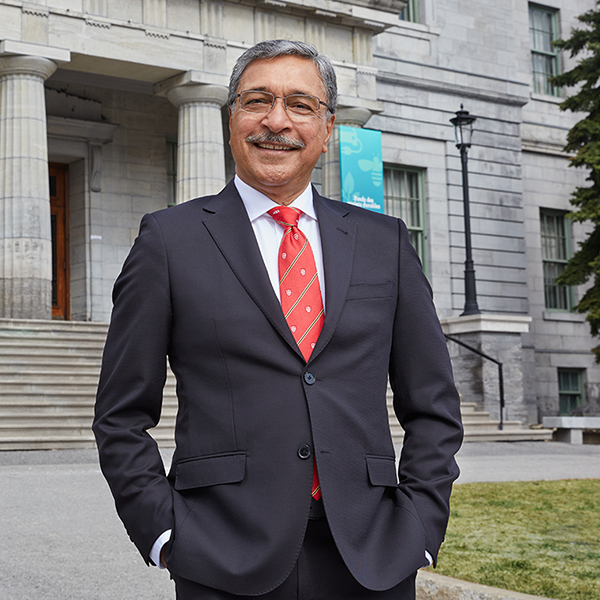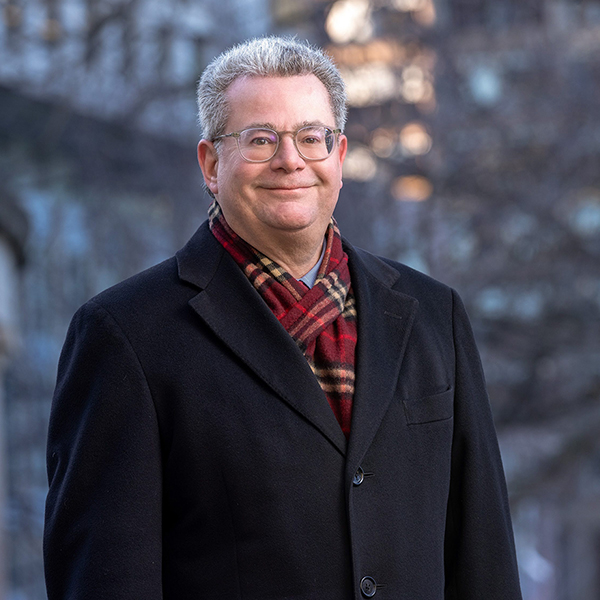“McGill the Great, McGill the Good” is a quote that you have shared in various contexts. What is its origin and significance?
“McGill the Great, McGill the Good,” is a phrase that I learned from Dr. Bernard J. Shapiro, BA’56, LLD’88, who served as McGill’s principal and vice-chancellor from 1994 to 2002. As an undergraduate student, volunteer, and principal emeritus, Dr. Shapiro has a profound understanding of what makes McGill special, which he captures poignantly in these few words.
As we plan for McGill’s third century and, more specifically, who we are and aspire to be in the future, I have found myself returning to his quote as a valuable anchor.
What are the principles that constitute “McGill the Great?”
“McGill the Great” signifies our culture of excellence. McGill is a place where people strive to be the best, where they challenge themselves and break new ground. This striving for greatness spans our history and continues to find expression on our campuses today.
What are some examples of greatness at McGill?
McGill is home to countless trailblazers who challenge conventional knowledge through their intellectual curiosity and research.
Professor Brenda Milner, one of the founding forces of clinical neuropsychology, revolutionized our understanding of the brain’s learning and memory mechanisms. In management, Professors Henry Mintzberg and Nancy Adler are recognized worldwide as pioneers in the fields of business strategy and cross-cultural management, respectively. Professor Victoria Kaspi has led the way in the exploration of our universe through her work on neutron stars and Fast Radio Bursts (FRBs), and Professor Charles Taylor is regarded as one of the most important philosophers in the world today. These are only a few examples of McGill professors who have achieved excellence in their field.
There is also no shortage of greatness among McGill’s students. For example, Daniel Almeida, a PhD student in neuroscience, was named to Forbes’ Top 30 under 30 list for his research on the molecular impact of childhood maltreatment on the brains of depressed patients. Last fall, McGill announced Abdel Dicko and Ffion Hughes as the latest recipients of the prestigious Rhodes Scholarships, bringing our tally of Rhodes Scholars to 147, the most in Canada.
The excellence of McGill and its people has been widely recognized by external organizations.
This past year alone, Dr. Lucy Gilbert was named to the Top 100 Women of Influence for her work on the early detection of ovarian and endometrial cancers. Professor Jennifer Welsh was elected a member of the renowned American Academy of Arts & Sciences for her work on humanitarian intervention and Canadian foreign policy, while Dr. Morag Park, director of the Goodman Cancer Research Centre, was appointed Knight of the National Order of Quebec, the province’s highest civilian honour.
What are the principles that constitute “McGill the Good?”
The second half of Dr. Shapiro’s quote, “McGill the Good,” adds important nuance, suggesting that this greatness is not pursued in the name of glory or to enhance our reputation, but for the benefit of humanity. These words remind us that McGill is deeply anchored in its community, both locally and globally, and that we have the capacity and the responsibility to be great while doing good.
What are some examples of “McGill the Good?”
Once again, there are countless instances of McGillians, in addition to those mentioned earlier, who are mobilizing their talent and knowledge to improve the world around them.
Some examples that come to mind readily include the late Dr. Mark Wainberg whose research led to the identification of a key anti-HIV-1 drug at the height of the HIV/AIDS crisis. During the Ebola outbreak, Dr. Joanne Liu, now a professor in McGill’s School of Population and Global Health, coordinated global health emergency efforts as the international president of Doctors Without Borders. In our School of Social Work, Professor Cindy Blackstock is working with international organizations, such as the United Nations, to protect the rights of Indigenous children.
In addition to helping some of the world’s most vulnerable populations, many others are applying themselves to combat climate change. Every year, through McGill’s Catalyst Awards, we recognize students, professors and staff who are engaging their community around sustainability and are implementing greener practices at McGill. Meanwhile, researchers such as Professor Andrew Gonzalez are examining the changes in biodiversity and their impacts on human society to advance Canadian conservation and policy.
During the pandemic, experts such as Dr. Don Sheppard and Dr. Matthew Oughton offered their time to the media to dispel misinformation about the virus and to reassure the population. Our students have also risen to the occasion. For example, students in McGill’s Master of Management in Analytics program are volunteering with Quebec small businesses to offer practical, data-informed insights to accelerate their economic recovery.
How will these words shape McGill’s next century?
The pandemic has brought to light the incredible feats that can be accomplished when the world’s top thinkers unite and coordinate effectively around a common goal. It has also foreshadowed the kind of collaboration that will be needed to address other complex crises, such as climate change.
In other words, this period has shown us the power of combining the Great with the Good. As McGill embarks on its third century, this principle will continue to be our North Star in fulfilling our academic mission. When McGill’s people apply their talents, skills and knowledge to today’s issues, we know that there are no bounds to the positive impact they can make on our world.

